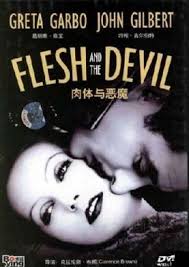
THE FLESH AND THE DEVIL
US, 1926, 109 minutes, Black and white.
Greta Garbo, John Gilbert, Lars Hanson, Barbara Kent.
Directed by Clarence Brown.
The Flesh and the Devil came at the end of the silent period. It was one of the earliest of Greta Garbo’s films in the United States and teamed her with John Gilbert with whom she appeared also in A Woman of Affairs as well as Queen Christina.
The film was directed by Clarence Brown, a director of many upmarket MGM titles in the 1930s and 1940s including Of Human Hearts, Idiot’s Delight and Edison the Man. He also filmed some very strong pictures during the war years: The Human Comedy, The White Cliffs of Dover, National Velvet and, after the war, The Yearling and Intruder in the Dust.
This film is very melodramatic. Garbo portrays a married woman who has an affair with a young man, neglecting to tell him about her husband. He then kills the husband in a duel but is made to do military service for five years. On his return, he finds that she has married his best friend for his wealth.
The title of the film indicates the variety of themes, especially of the flesh – although the title of the novel on which it was based was called The Undying Past.
1. The title, as explained? The plot illustrating the title, a moral fable of the twenties for popular entertainment?
2. The quality of the silent techniques - in the late silent era, camera, acting styles?
3. The quality and tone of the captions? Set up in studios, the status of the stars and their careers? Impact now, in retrospect?
4. The focus on the two men and the bonds between them, the importance of the academy sequences at the opening, Los and his cavalier attitude? Ulrich and his making excuses? Their youth, military training, the background of the military academy? The exuberance of their return, their memories and the flashback about the Island of Friendship? The way the bonds were illustrated especially in the warmth, physical contact etc.? The irony of the bond and Felicitas coming between them?
5. Views of Germany in the late twenties for the background of the film? Distancing it from the American audience? The background of German aristocracy, the Army, the atmosphere for such melodramas?
6. The aristocratic background and its presentation, Leo's family and wealth? Ulrich's wealth? Society, for example Leo's return with all the servants present? The ball? Felicitas and her husband and her desire for wealth, duelling and exile, military service and influence?
7. John Gilbert's style as Leo? As a type, the comparison with Ulrich? Their strengths and weaknesses? Youth, wealthy, romance? Hertha and another bond between them? The importance of the Island of Friendship, their being there together, the statue, the blood bond?
8. The entry of Felicitas into this kind of world? Greta Garbo's style, her emerging from the train and Leo's infatuation, the initial encounter? At the ball and her being with the women who gossiped about her, her dancing with Leo and his fascination? Her leading him on and not telling him the truth, compromising him? audience judgment on Felicitas from the beginning?
9. The effect on Leo of her presence and his continually seeking her out? The contrast with Hertha? The discovery and Loo's reaction, the duel? (The visual effect of the duel?)
10. The repercussions for Leo, military exile, Africa, the consequences in Africa and his longing, the exhilaration of his return?
11. Ulrich and his friendship, his commission, for Felicitas, his marrying her? Felicitas being excited at the prospect of wealth?
12. Felicitas' reaction on Leo's return? Her distance, infatuation removed? Promises to go away and continually breaking her promises? The build-up to the duel and her ignoring it? The melodrama of Hertha, arriving and her prayer? was Felicitas's change of heart credible, her dying?
13. The build-up to the duel and each unable to shoot at the other?
14. The character of Hertha, as it emerged with her prayers? Her going away and the happy ending? The contribution of Loo's mother?
15. The techniques and impact of the melodrama of the silent screen? Have melodramas basically changed? Audiences enjoying them, accepting their limitations? The values of expected right and wrong that they present?